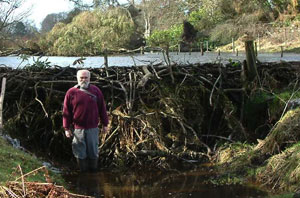
BEAVERS have been condemned as having a “major adverse impact” on salmon and sea trout according to a new north American study.
The warning comes on the eve of the planned release this month of beavers into the wild in Scotland and has been welcomed by the Salmon & Trout Association, the UK’s leading game fishing conservation body.
The S&TA, whose patron is Prince Charles, himself a keen angler, said today the report should be “required reading” for supporters of the Scottish trial.
The study, commissioned by the Atlantic Salmon Federation, north America’s main salmon conservation organisation, examined the impact of beavers on Canada’s Prince Edward Island since they were re-introduced in 1949.
It concludes that unless beavers are removed or culled on an ongoing basis, the result will be “the demise of salmon runs” in at least three of the island’s rivers and fish populations placed “in jeopardy” in a further seven.
The study says beaver dams “prevent salmon from reaching preferred spawing and nursery sites and sometimes prevent young salmon from going to sea.”
Four sets of beaver families totalling 17 individuals are planned for release into the wild in Knapdale, Argyllshire this month in a trial for the first-ever planned reintroduction of a mammal to Scotland.
The project, costing £1m, is backed by Scottish Natural Heritage, the Scottish Wildlife Trust and the Royal Zoological Society of Edinburgh, but has provoked mounting concern and criticism from the angling lobby.
Paul Knight, executive director of the S&TA said today: “Apart from the ten rivers whose salmon populations are currently under threat, the Prince Edward report identifies 11 rivers on the island which have actually lost their salmon populations since 2002. It concludes that ‘beaver blockages appear to be the main reason’.
“It is worth noting that beavers were re-introduced to Prince Edward Island in 1949 but six decades on it is clear that their impact on salmon numbers has been little short of catastrophic. Surely this must cause alarm bells to ring within Scottish Government.”
The S&TA said it was now vital that proper scientific research was carried out into the likely impact of burgeoning beaver numbers on migratory fish in Scotland, and elsewhere in the UK.
The Tweed Foundation, which has already published a lengthy science-based factsheet rebutting supporters’ claims for the project, said:
“The evidence from countries where beavers have been introduced is that they cannot be contained and that they would cause harm to our native fish stocks by building dams. I believe that the Government and their advisors now understand this and I expect it to be reflected in their future plans for species introductions”.
Related story: